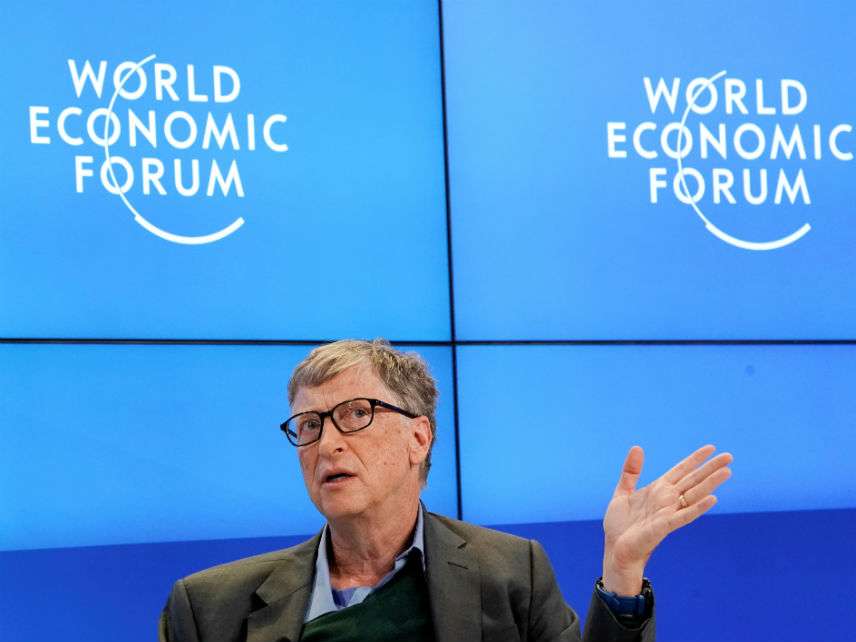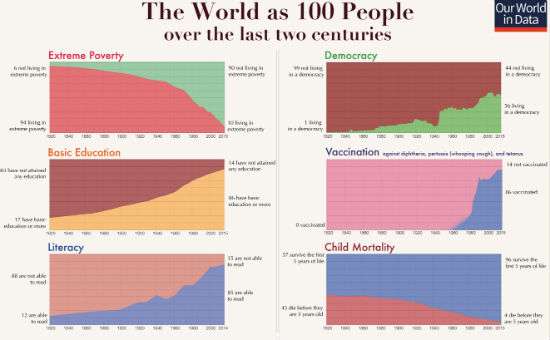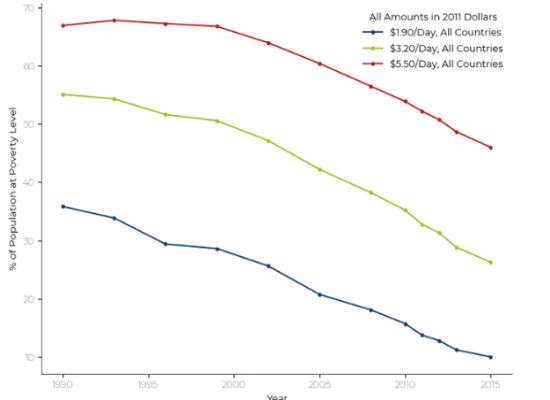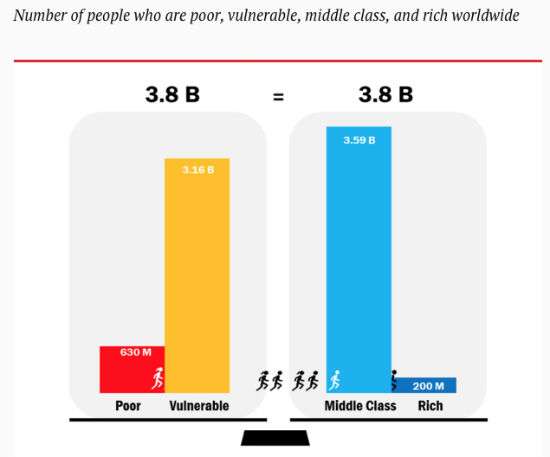Global Poverty Decline Denialism
An anti-market ideologue tortures the data at The Guardian.

Some gloomsters perversely refuse to acknowledge when a glass is even half empty, especially when doing so cuts against their ideological sensitivities. One ploy is to pour the data into a bigger glass and hope that no one notices. London School of Economics anthropologist Jason Hickel has given us a near-perfect example of this sort of sleight-of-hand in Guardian column headlined "Bill Gates says poverty is decreasing. He couldn't be more wrong."
At this month's meeting of the World Economic Forum in Davis, Gates cited data that show the proportion of people living in extreme poverty declining from 94 percent in 1820 to only 10 percent today. "The claim is simple and compelling," asserts Hickel. "And it's completely wrong."
Actually, it's Hickel who gets it entirely wrong.
Gates' alleged offense is to have shown a slide devised by the folks at the invaluable Our World in Data project. As you can see, it tracks six positive economic and social trends over the past 200 years:

Hickel mischaracterizes that first chart as a count of "people living in poverty." Then he complains that the cutoff—an income equivalent to $1.90 per person per day—is "obscenely low." But absolutely nobody is claiming that living on $1.90 a day is a picnic. The condition being measured here isn't poverty but extreme poverty, as defined by the World Bank. And that has indeed been declining steeply over the past four decades.
Hickel claims that there are a number of problems with Gates' graph. "First of all, real data on poverty has only been collected since 1981," he argues. "Anything before that is extremely sketchy, and to go back as far as 1820 is meaningless." As we'll see, that's also wrong, but for now let's follow Hickel's lead and look at that more recent period.
So what do the "real data" on poverty tell us? Starting with that $1.90-per-day measurement, the level of extreme poverty fell from 42.2 percent of the world's population in 1981 to 8.6 percent in 2018. In 1981, 1.9 billion people lived on less than $1.90 per day; in 2018, the number was around 660 million.
Don't like that metric? The World Bank has adopted two additional poverty threshold measures at $3.20 and $5.50 per day per person. They too are falling:

But Hickel doesn't bother to tell his readers what the global income data say about those trends. Instead he insists on his own threshold of $7.40 per person per day. "We see that the number of people living under this line has increased dramatically since measurements began in 1981, reaching some 4.2 billion people today," he observes.
Charitably interpreted, Hickel has succumbed to judgment creep. The Harvard psychologist Daniel Gilbert and his colleagues have argued, in a 2018 study published in Science, we are misled about the state of the world because we have a tendency to continually raise our threshold for success as we make progress. "Solving problems causes us to expand our definitions of them," they explain. "When problems become rare, we count more things as problems. Our studies suggest that when the world gets better, we become harsher critics of it, and this can cause us to mistakenly conclude that it hasn't actually gotten better at all. Progress, it seems, tends to mask itself."
In 1981, 42.2, 57.1, and 66.4 percent of the world's population fell below the $1.90, $3.20, and $5.50 thresholds respectively. By 2015, those ratios had dropped to 10.0, 26.3, and 46.0 percent. Even though the world population increased from 4.5 to 7.3 billion from 1981 to 2015, the absolute number of people living on less than $5.50 a day peaked at around 4 billion in 1999 and fell to 3.4 billion in 2015. If current rising income trends continue, the number of people living on less than $7.40 per day will soon start to drop too. At which point Hickel will again have to shift his goalposts.
And yes, the absolute number of people living under Hickel's threshold has increased. But that's just because the world's population has gone up. The percentage of people in that category has been falling.
Meanwhile, using slightly different data, researchers associated with the World Data Lab and the Brookings Institution reported in September 2018 that "just over 50 percent of the world's population, or some 3.8 billion people, live in households with enough discretionary expenditure to be considered 'middle class' or 'rich.' About the same number of people are living in households that are poor or vulnerable to poverty." These researchers broadly define the "middle class" to cover households spending $11 to $110 per day per person, in 2011 purchasing power parity. (Purchasing power parity is when the price of identical goods and services are equal in one country and another country when factoring in the exchange rate.)

Hickel is also wrong when he claims that trying to calculate extreme poverty rates as far back as 1820 is "meaningless." He asserts that the folks at Our World in Data are inappropriately citing a 2002 study that was focused chiefly on inequality in the distribution of world GDP. But determining inequality ratios requires that you figure out the spread of incomes that people earned. In this case, the researchers used the World Bank's extreme poverty threshold, measured as living on less than $1 per day in 1985 dollars, and reported that it "fell from 84 percent of the world population in 1820 to 24 percent in 1992." Measured as living on less than $2 per day in 1985 dollars, they calculated a 94 percent poverty rate in 1820.
"World economic growth, though strongly inegalitarian, contributed to a steady decline in the headcount measure of poverty throughout the period under analysis," the researchers report. "Over the 172 years considered here, the mean income of world inhabitants increased by a factor of 7.6. The mean income of the bottom 20 percent increased only by a factor of slightly more than 3, that of the bottom 60 percent by about 4, and that of the top decile by almost 10." In other words, as a global average, the rich got richer faster than the poorest folk did, but the circumstances of both improved significantly. The same dynamic is still at work today, and that's what really annoys Hickel.
Why did Hickel feel the need to deny that plain facts about these positive global trends? Largely because he wants to claim even if global poverty as measured by mere monetary income has been declining, that actually implicates pervasive Western oppression. What these data on improving incomes really "reveal is that the world went from a situation where most of humanity had no need of money at all to one where today most of humanity struggles to survive on extremely small amounts of money," he claims. "Prior to colonisation, most people lived in subsistence economies where they enjoyed access to abundant commons—land, water, forests, livestock and robust systems of sharing and reciprocity. They had little if any money, but then they didn't need it in order to live well—so it makes little sense to claim that they were poor."
Not to complicate matters too much, but most people encountered by colonizers lived in hierarchical, largely agricultural societies—empires, kingdoms, etc.—and not in the egalitarian commons of Hickel's imagination. But some groups, such as the aborigines in Australia and the Kung! in Africa, remained more or less pure hunter-gatherers. It's not a good idea to romanticize their lives: A 2013 study aggregating mortality data for several groups of hunter-gatherers reports an average infant mortality rate (defined as death before the child's first birthday) of 27 percent and a child mortality rate (death before the 15th birthday) of 49 percent. The Our World in Data chart cited by Gates notes that the global child mortality rate (here defined as death before age 5) declined from 43 percent in 1800 to 4.3 percent now. Similarly, a 2007 review article of life trajectories of various subsistence society groups found that "on average 57 percent, 64 percent, and 67 percent of children born survive to age 15 years among hunter-gatherers, forager-horticulturalists, and acculturated hunter-gatherers." (The researchers define acculturated hunter-gatherers as groups that have either recently started horticulture and/or have been exposed to medicines, markets, and other modern amenities.)
Hickel does have a grain of a point here: If a society meets a substantial share of people's needs outside the monetary economy, income statistics aren't the best way to measure their well-being. But you can still compare life expectancy in those communities to life expectancy elsewhere. The 2007 review article finds that "among traditional hunter-gatherers, the average life expectancy at birth varies from 21 to 37 years, the proportion surviving to age 45 varies between 26 percent and 43 percent, and life expectancy at age 45 varies from 14 to 24 years." That's essentially the same range as global life expectancy in 1800. In 2016, global average life expectancy exceeded 72 years. The proportion of hunter-gatherers surviving to age 45 is considerably lower than 55 percent of Englishmen back in 1851. The range of 14 to 24 years of additional life expectancy for hunter-gatherers at age 45 is basically the same as for Europeans at age 65 today.
Nor is life expectency the only statistic at our disposal. That 2007 paper reports that violence (homicide and warfare) accounted for 18.8 percent of the deaths among the subsistence groups under review. For comparison's sake, interpersonal and collective violence in 2016 claimed the lives of 560,000 people around the world. Given a world population of 7.7 billion, that's a death by violence rate about 0.007 percent.
Why has Hickel engaged in such statistical subterfuges and Edenic anthropological handwaving? Because he despises "free market capitalism" and wants to issue "a ringing indictment of our global economic system, which is failing the vast majority of humanity." Except, as we've seen, it is not. During the past two centuries, that system has lifted billions out of humanity's natural state of abject poverty, ignorance, and violence, and that process of economic uplift has dramatically accelerated in the past four decades. If the institutions that undergird that growth can be sustained, average incomes will continue to their rapid rise, enabling those around the globe who are still mired in poverty to enjoy ever greater prosperity.
Bottom line: Bill Gates is right that poverty is decreasing, and Hickel couldn't be more wrong.


Show Comments (68)